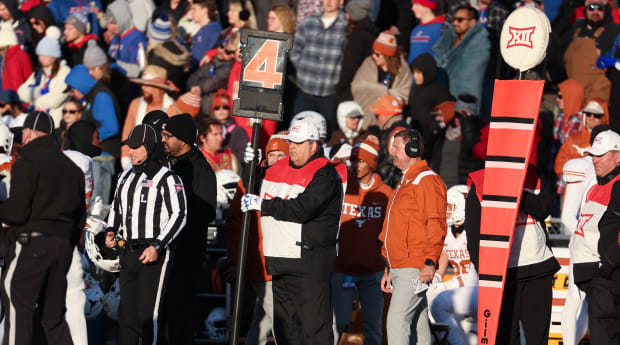A years-long effort in exploring ways to shorten college football games is entering the fourth quarter.
Executives of the sport are moving closer to recommending several clock rule changes meant to reduce plays for both safety and game length reasons, multiple officials tell Sports Illustrated. They include proposals that call for the clock to continue to run after first downs and incomplete passes.
High-ranking college football leaders have been reviewing four specific changes to clock rules, two of which are considered non-controversial, one that has garnered wide support and a fourth that has left some divided. The non-controversial proposals include (1) prohibiting consecutive timeouts (ie, icing kickers) and (2) no longer extending a first or third quarter for an untimed down if the quarter ends on a defensive penalty (the down would be clocked starting the next quarter).
While those are considered to be incremental changes that will save only a fraction of time, the other two proposals are more significant.
In a third proposal that is garnering wide support, the clock will continue to run after an offense gains a first down except inside of two minutes in a half. In a more controversial fourth proposal, the clock will continue to run after an incomplete pass once the ball is spotted for play.
While the changes would be implemented this fall, they are several weeks away from final approval. Several athletic administrators spoke to Sports Illustrated for this story under condition of anonymity because the changes have not yet been recommended, approved or even widely socialized with member schools. However, many officials involved in the process expect at least a portion of the proposals to pass—something that did not happen last year during a similar exercise.

Scott Winters/Getty Images
Many of the proposed rule changes would bring college football in line with the NFL’s own playing rules. The NFL does not allow coaches to use back-to-back timeouts during a single dead-ball period and does not stop the clock after first downs are gained. However, the NFL does stop the clock after incomplete passes.
College football conducted a field study last season to ascertain the impact of the proposed changes. A running clock after a first down would eliminate about seven to nine plays per game. A running clock after an incomplete pass could eliminate more than twice that number.
The rule changes were discussed at length during the American Football Coaches Association convention last month. The impact of a running clock after an incompletion could be so significant that many officials believe coaches, in an attempt to negate the reduction of plays, would implement a more up-tempo offense.
Offenses, many of which already operate in a hurry-up mode, would move to “super turbo,” as one official said, potentially negating the elimination of plays and heightening the risk of injury.
Game length is more of an FBS problem, says one administrator. It is unclear if the clock rule changes would eventually be adopted by Division II and Division III. While under the Division I umbrella, FCS is expected to be impacted if the changes were approved.
These proposals are emanating from a working group commissioned by the College Football Officials (CFO) Board of Managers, a 12-member group made up of the 10 FBS commissioners and two FCS commissioners. The group is tethered to the College Football Playoff. If approved, these changes come on the heels of the CFP’s decision to expand the playoff to 12 teams, adding two more rounds and eight games.
ACC commissioner Jim Phillips, chair of the working group, has publicly expressed his intention to shorten player exposures given additional postseason games. It was the reason, he’s said in the past, for his initial hesitancy in supporting playoff expansion.
The proposals from the Phillips-led CFO working group are expected to be brought before the NCAA Football Playing Rules Committee at their meeting next month in Indianapolis. The committee is charged with reviewing and determining which proposals continue down the NCAA’s governance path.
The NCAA Football Playing Rules Committee, as well as other NCAA groups, have spent the last several years examining ways to address a festering problem within college football: game length and game pace.
The average FBS football game last season stretched 3 hours and 21 minutes, a slight increase from the year before (3:18) and five minutes longer than the 2018 average of 3:16.
That well eclipses the NFL’s average, which normally hovers around 3 hours, 10 minutes. Game lengths in the NFL are much more consistent than college, which can vary greatly and include some four-hour affairs. About one-fifth of FBS games this past year went longer than three and a half hours.
There are reasons for this.
While NFL games average about 155 plays, the average in FBS is around 180. The NFL is more efficient offensively, which helps in both game length and pace of play (there are not as many incomplete passes, for instance). Professional halftimes span just 12 minutes (college halftimes are 20). The replay system in the NFL relies upon a coaches challenge system (in college, an official in the press box reviews each play for accuracy).
FBS games see about 2.3 replay stoppages per game, a figure that continues to rise and has officials considering a coaches challenge system—something that seems likely in the future.
Television commercials don’t impact game time significantly. From 2018-2020, games not televised finished only about two minutes sooner than those televised.







